
| Centre Name: | 
Centre for Chinese Studies Research 中华研究中心 |
| Chairperson: | Dr. Wong Wun Bin 黄文斌副教授 |
| Description of Centre: | Chinese culture has its great breadth and depth in the wisdom and experience accumulated in China for thousands of years. Chinese studies that is established as an academic discipline as a result covers philosophy, history, language, literature, science, art and other related fields. In multiethnic Malaysia, Chinese studies for adaptation and survival takes on a significant aspect of research on the Chinese and their culture across ethnicities. With globalization and the rapid growth of China in its transition, China’s current politics, economics, culture and education are also of research interest internationally. In the age of complexity and speed in change, the Centre for Chinese Studies was set up in Universiti Tunku Abdul Rahman for members who would like to delve into traditional Chinese culture, the local Chinese, and contemporary China. Besides academic research, the centre assumes the roles of promoting Chinese culture and arts, infusing the local and the innovative, and engaging international exchange. 中华文化博大精深,它包含了中华民族数千年来累积的智慧与经验,而作为学术范畴的中华研究,涵盖了中国哲学、历史、语文、文学、科学、艺术等学科。然而,为了适应与生存,处在一个多元族群国家的马来西亚,华人及跨族群文化研究亦必然成为中华研究的重点之一。与此同时,全球化为当前国际发展的大趋势,中国也正处于高速转型时期,是故当代中国的政经文教也是全球瞩目的研究课题。在面对错综复杂与迅速变迁的时代,拉曼大学成立了中华研究中心,有志于从事传统中华文化、马来西亚华人各领域及当代中国之研究。除了学术研究外,中华研究中心也肩负推广与弘扬中华文化与艺术、融入本土与创新及与国际接轨之角色。 |
| Research area: |
|
| NO. | NAME | FACULTY | MEMBER |
|---|---|---|---|
| 1 | Assoc. Prof. Dr. Wong Wun Bin | ICS | Chairperson |
| 2 | Asst. Prof. Dr. Tan Ai Boay | ICS | Unit Head of Malaysian Chinese and Cultural Studies Unit |
| 3 | Assoc. Prof. Dr. Chong Siou Wei | ICS | Unit Head of Min-nan Cultural Studies Unit |
| 4 | Asst. Prof. Dr. Tan Beng Piou | ICS | Unit Head of Sinology Unit |
| 5 | Assoc. Prof. Dr. Chin Chong Foh | ICS | Unit Head of Contemporary China Studies Unit |
| 6 | Asst. Prof. Dr. Lee Soo Chee | ICS | Unit Head of Modern Chinese Literature Studies Unit |
| 7 | Asst. Prof. Dr. Ling Liong Ngo | ICS | Unit Head of Chinese Arts Research Unit |
| 8 | Asst. Prof. Dr. Ng Bung Chen | ICS | Unit Coordinator of Malaysian Chinese and Cultural Studies Unit |
| 9 | Asst. Prof. Dr. Toh Teong Chuan | ICS | Unit Coordinator of Min-nan Cultural Studies Unit |
| 10 | Assoc. Prof. Dr. Tee Boon Chuan @ Zheng Zhiyi | ICS | Unit Coordinator of Sinology Unit |
| 11 | Mr. Teh Boon Teck | FAS | Unit Coordinator of Contemporary China Studies Unit |
| 12 | Assoc. Prof. Dr. Liau Ping Leng | ICS | Unit Coordinator of Modern Chinese Literature Studies Unit |
| 13 | Asst. Prof. Dr. Pua Shiau Chen | ICS | Unit Coordinator of Chinese Arts Research Unit |
| 14 | Assoc. Prof. Dr. Khor Boon Eng | ICS | Member |
| 15 | Asst. Prof. Dr. Chou Wen Loong | ICS | Member |
| 16 | Asst. Prof. Dr. Er Lee Siong | ICS | Member |
| 17 | Asst. Prof. Dr. Lew Hoi Len | ICS | Member |
| 18 | Asst. Prof. Dr. Lim Chee Men | ICS | Member |
| 19 | Asst. Prof. Dr. Th'ng Bee Fu | ICS | Member |
| 20 | Asst. Prof. Dr. Wong Lih Lih | ICS | Member |
| 21 | Asst. Prof. Dr. Yap Siew Chin | ICS | Member |
| 22 | Mr. Mok Tuck Hau | ICS | Member |
| 23 | Ms. Chiok Phaik Fern | FAS | Member |
| 24 | Mr. Lim Kar Loke | FAS | Member |
| 25 | Ms. Tan Swee Mee | FAS | Member |
| 26 | Asst. Prof. Dr. Wu Ming Chu | FCI | Member |
| 27 | Ms. Tan Wooi Yee | FCI | Member |
| 28 | Ms. Yap Yuet Ngor | CFS | Member |
| 29 | Asst. Prof. Dr. Charanjit Kaur a/p Darshan Singh | FCI | Associate Member |
| 30 | Cik. Ira Meilita Binti Ibrahim | FCI | Associate Member |
| 31 | Pn. Nazirah Binti Ismail | FCI | Associate Member |
| 32 | Cik. Norazilah Binti Buhari | FCI | Associate Member |
| No. | Date | Event |
|---|---|---|
| 1 | 30-Jan-19 | Seminar Title: Research Method of Malaysian Chinese Literature Speaker: Prof. Dr. Ng Kim Chew Prof. Dr. Tee Kim Tong AP Dr. Ko Chia Cian Mr .Woo Kam Lun Venue: KB004, UTAR, Sungai Long Campus 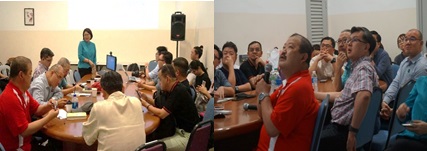
|
| 2 | 2-Mar-19 | International Seminar Title: Classical and Modern Sinophone Literature Speaker: Prof. Dr. Mei Chia-ling Prof. Dr. Tsai Yu Prof. Dr. Kang, Yun-mei AP Dr. Ko Chia Cian AP Dr. Liu, Cheng-chung Venue: KB104, UTAR, Sungai Long Campus 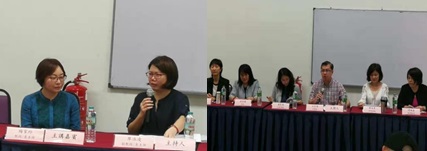
|
| 3 | 13-Mar-19 | Seminar Title: Kampar History & Tourist Industry peaker: AP Dr. Wong Wun Bin Venue: PF067, UTAR, Kampar Campus 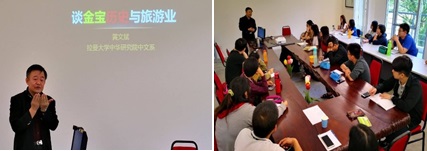
|
| 4 | 20-Mar-19 | Seminar Title: Exploring a Natural Treasure: Zhuo Zhong Ming's Art of Golden Leaf-Whistling or Leaflute Music as Intangible Cultural Heritage Speaker: Prof. Zhuo Zhong Ming Venue: A003, UTAR, Kampar Campus 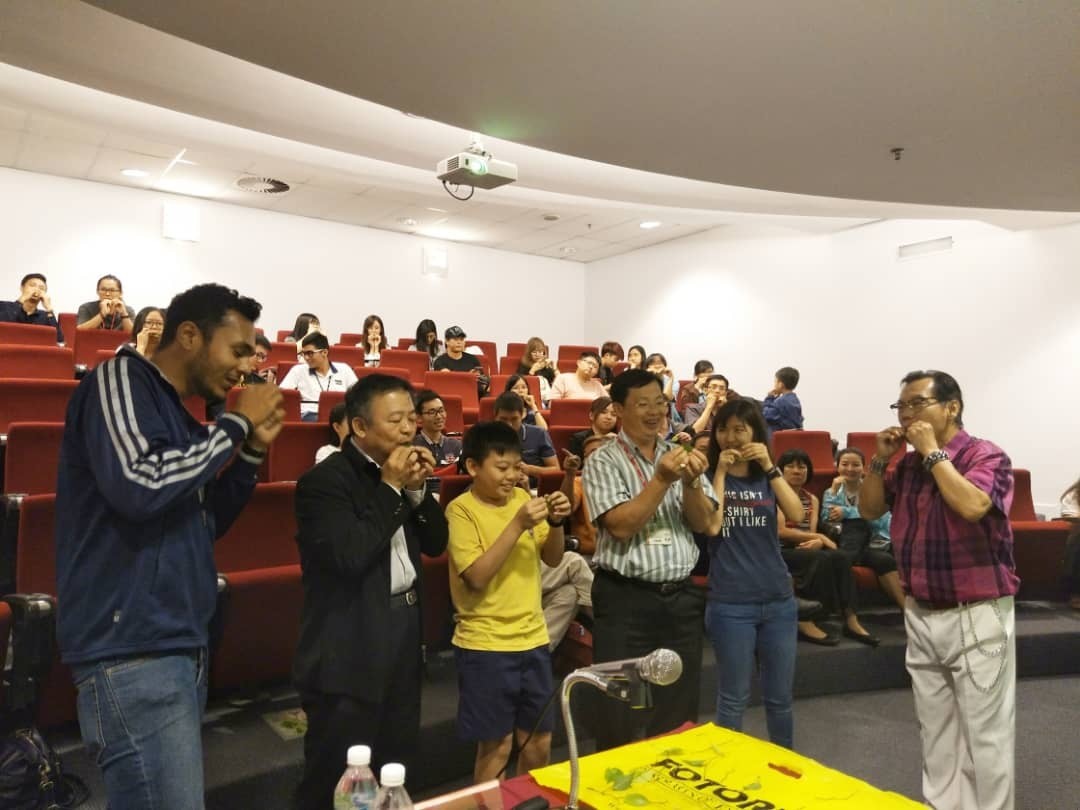
|
| 5 | 31-Mar-19 | UTAR Chinese Literature Week 2019 Title: Back to UTAR with Poems: Literary Talk on Poetry Writings by Three UTAR Alumnus Speaker: Lai Zhi Kang, Huang Long Kun & Zheng Yu Lun Venue:M002, UTAR, Kampar Campus |
| 6 | 11-Jun-19 | Seminar Title: Imagination, Memory and Realistic: All about Rainforest Writing Speaker: Mr. Ang Tian Huat (Hai Fan) Venue: P005, UTAR, Kampar Campus |
| 7 | 26-Jun-19 | Seminar Title: To My City with Love: 5th Years Anniversary of City-eye peaker: Mr. Ch'ng Kar Guan & Ms. Chong Lee Choo Venue: P004, UTAR, Kampar Campus 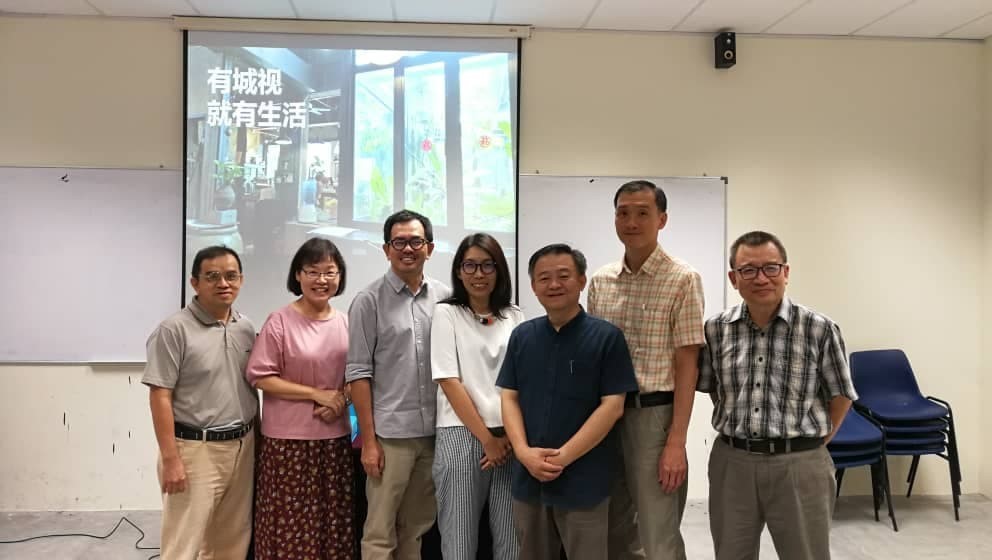
|
| 8 | 3-Jul-19 | Seminar Title: The Historical Figure Research Method: Case Study in H.S.Lee Speaker: Dr. Tan Miau Ing Venue: P007, UTAR, Kampar Campus |
| 9 | 9-Jul-19 | Workshop Title: Hakka Language and Cultural Research in Taiwan Speaker: Prof. Dr. Lin Pen Hsuan, Prof. Dr. Fahn Rueh Lirng, Assoc. Prof. Dr. Wong Wun Bin, Asst. Prof. Dr. Wong Lih Lih Venue: PF067, UTAR, Kampar Campus 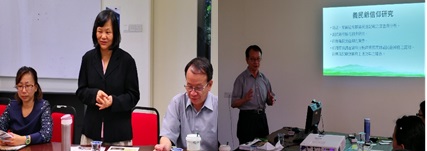
|
| 10 | 10-Jul-19 | Campaign Title: Saving the Historical Materials of Century-old Malaysian Drama in Chinese Speaker: >Dr. Sim Kok Meng & Mr. Soon Tien Yang Venue: N107, UTAR, Kampar Campus 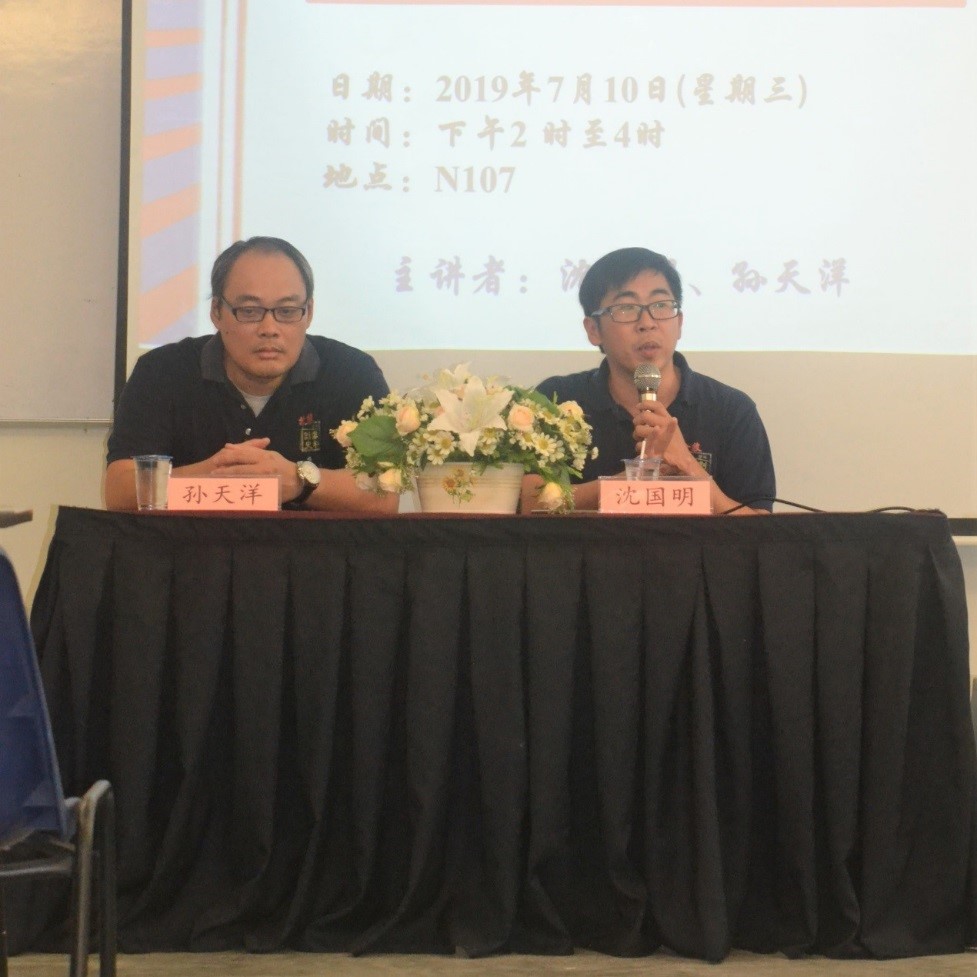
|
| 11 | 17-Jul-19 | Seminar Title: Wish Heart Like The Sea Speaker: Mr. Xu Hui Zhi Venue: P005, UTAR, Kampar Campus |
| 12 | 24-Jul-19 | Seminar Title: Memory and Digitalized: Writing Public History Speaker: Prof. Lin Sinn-Cheng Venue: P005, UTAR, Kampar Campus |
| 13 | 31-Jul-19 | Seminar Title: Perilous Journey of the Tin Miners Speaker: Mr. Chin Soong Kead Venue: PF067, UTAR, Kampar Campus 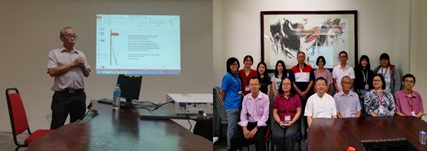
|
| 14 | 14-Aug-19 | Seminar Title: Min-nan Folk Literature in Pingtung, Taiwan and Malaysia peaker: Dr. Huang Wen Chu enue: P007, UTAR, Kampar Campus |
| 15 | 14-Aug-19 | Seminar Title: The Studies of Minnan: Reconsider of Fieldwork and Local History Materials Speaker: Assoc. Prof. Tsung-Yuan, Chen Venue: NF023, UTAR, Kampar Campus |
| 16 | 28-Aug-19 | Seminar Title: Guided Sharing and Book Reviews of Malayan Sketches (Newly Edited and Annotated) peaker: Prof. Wong Yoon Wah, Ms. Quek See Ling, Ms. Qiu Li Lian & Dr. Lee Soo Chee Venue: NF023, UTAR, Kampar Campus |
| 17 | 8-Oct-19 | Seminar Title: Korean Redology and Korean Translations of Dream of the Red Chamber Speaker: Prof. Choe Yongchul Venue: PF067, UTAR, Kampar Campus |
| 18 | 26-Oct-19 | Workshop Title: Hakka Tin Miners and the History of Tin Mining Industry Speaker: Dr. Wong Wun Bin & Dr. Pek Wee Chuen Venue: The Hall of Tseng Lung Fui Kuon, Kampar 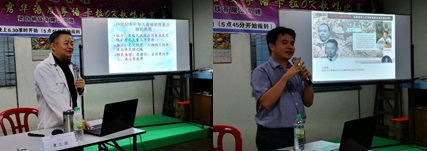
|
| 19 | 30-Oct-19 | Seminar Title: CChS Researcher Academic Presentation Series: Folk Literature, Buddhist Literature and Education Speaker: Dr. Tan Beng Piou, Dr. Lee Soo Chee & Dr. Toh Teong Chuan Venue: P005, UTAR, Kampar Campus |
| 20 | 26-Nov-19 | Seminar Title: Accompanying is the Most Luxurious Gift in the World: A Literacy Talk by Peter Su (Taiwan) Speaker: Mr. Peter Su Venue: IDK4, UTAR, Kampar Campus |
| 21 | 5-Dec-19 | Workshop Title: Chinese Culture, Literature and Overseas Chinese Society Speaker: Speakers from ICS and other Chinese Studies Department in Taiwan Venue:P004, UTAR, Kampar Campus |
| No. | Activity | |
|---|---|---|
| 1 | New Book on Hakka Tin Miner Unveiled
8 June 2019 Grand Kampar Hotel, Kampar Institute of Chinese Studies (ICS) Deputy Dean for Academic Development and Undergraduate Programme Assoc Prof Dr Wong Wun Bin and alumna Chan Hui Cheng co-authored a book which was unveiled at Grand Kampar Hotel, Kampar, Perak on 8 June 2019. Titled “The Hometown Complex and Local Participation: A Case Study on the Ipoh Tin Miner Lee Kwee Foh” («故乡情意结与在地参与:马来亚怡保客籍锡矿家李桂和研究»), the book was unveiled in conjunction with the official launch of the “Kayin Scholarship Loan Fund 60th Anniversary Magazine” held during the 68th Annual General Meeting of Federation of Ka Yin Chu Associations of Malaysia from 8 to 9 June 2019. Present at the book launch were UTAR Planning and Development Committee Advisor Tan Sri Hew See Tong, who is also the Honorary President of the Federation of Ka Yin Chu Associations of Malaysia; Federation of Ka Yin Chu Associations of Malaysia’s Past President Dato’ Seri Dr Lee Yow Ching, President Ir Chin Ching Chung, Perak Ka Yin Association President Dato’ Hew Choy Kon, and Student Scholarship and Loan Committee Head Chong Chi Ping; Kampar Meijiang Association President Phan Yau Yin; and UTAR ICS Dean Assoc Prof Dr Chong Siou Wei. Proud and delighted to witness the book launch, Dato’ Seri Lee expressed his fervent wish for the Federation and UTAR to continue deepening their collaboration. “The Federation can certainly support UTAR undergraduates and postgraduates whose research interests are in the Hakka community. Their theses could then be published into a series of books to promote academic research in the field of Malaysian Chinese history. It is also my ultimate hope to see all historical information vis-à-vis the involvement as well as the various contributions by local Chinese in the areas of arts, culture, history, politics, education, science and so on being compiled, thus forming the basis of a complete record of Malaysian Chinese history,” he said, also sharing British historian Arnold J. Toynbee’s quote “Civilisations die from suicide, not by murder” to encourage everyone to be proactive in cultural preservation and heritage initiatives. Besides echoing Dato’ Seri Lee’s sentiments, Dr Chong also explained that the book is one of the fruits of ICS and the Centre for Chinese Studies’s (CCS) labour following the signing of a memorandum of understanding (MoU) between UTAR and the Federation in 2017. “This is the first outcome of the Hakka Ka Yin clan’s research series in which we are really thankful to the Federation for its support. Hakka research is one of ICS’s popular research areas among the academics. In fact, there are those who supervise their students’ final year projects in Hakka research as well. And ever since the signing of the MoU, CCS as a research centre under ICS has been vigorously delving into Hakka research, while ICS as an institute has been promoting Hakka research and nurturing talents,” he revealed. Dr Chong also pointed out that in order to commemorate the contributions of the Hakka pioneers to this country, ICS, CCS and the Federation will work closely in recording and publishing stories and research centred around the Hakka community, which also extends to other Hakka clans in Malaysia. “At this juncture, I would also like to thank Tan Sri Hew for bringing together UTAR and the Federation which eventually culminated in such research fruition,” the Dean said, and congratulated Dr Wong and Master of Arts (Chinese Studies) alumna Chan for their success. To allow the audience to have a closer glimpse at the late tin miner’s contributions, Dr Wong was then invited to briefly introduce Kwee Foh as well as the motivation in writing the book. According to Dr Wong, it all began with a meet-up with Kwee Foh’s nonagenarian son, Lee Ngan Chong, on one occasion in which the latter shared with him some narratives of the father’s life. “The late Kwee Foh was a philanthropist who appreciated his cultural roots and also participated in many associations after settling down in Menglembu, Ipoh. One of Kwee Foh’s special attributes is that besides making huge contributions to his hometown in Wuhua, Guangdong, China, which is not too common among tin miners of his generation, the late tin miner also actively contributed to education and other charities locally despite not being a frontline leader,” explained Dr Wong. He also highlighted other qualities of Kwee Foh such as inculcating his children with an appreciation for culture by exposing them to the participation of associations and societies. “Kwee Foh’s active participation in various associations made him a wearer of many hats. The fact that Kwee Foh was entrusted by many of these associations to be the treasurer reflect their trust and confidence in his integrity,” Dr Wong continued, adding that this research also received the full support of Ngan Chong. Also treading on the challenges in the process of completing this book, Dr Wong told, “One of the major challenges faced was the scarcity of information such as official historical records due to the fact that Kwee Foh wasn’t a frontline leader. It took Chan and I plenty of time and effort to search, collect and compile bits and pieces of information, be it from old news archives or books.” Also the Chairperson of CCS, Dr Wong said the strategy by ICS and CCS in recording and writing history is to focus on individual case study as a start. And through a series of case studies, the dots between them will be gradually connected to form the foundation of a greater historical background and timeline written from a bird’s eye view. The book launch reached its highlight when the VIPs were invited to unveil the newly published book. |
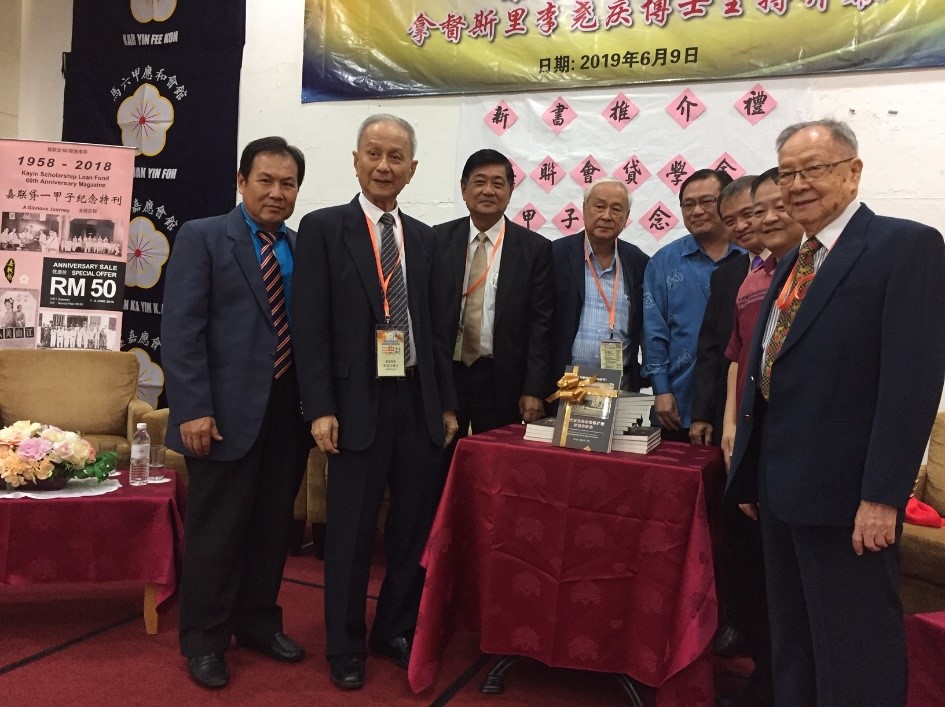
From left: Phan, Dato’ Seri Lee, Ir Chin, Dato’ Hew, Dr Chong, Chong, Dr Wong and Tan Sri Hew 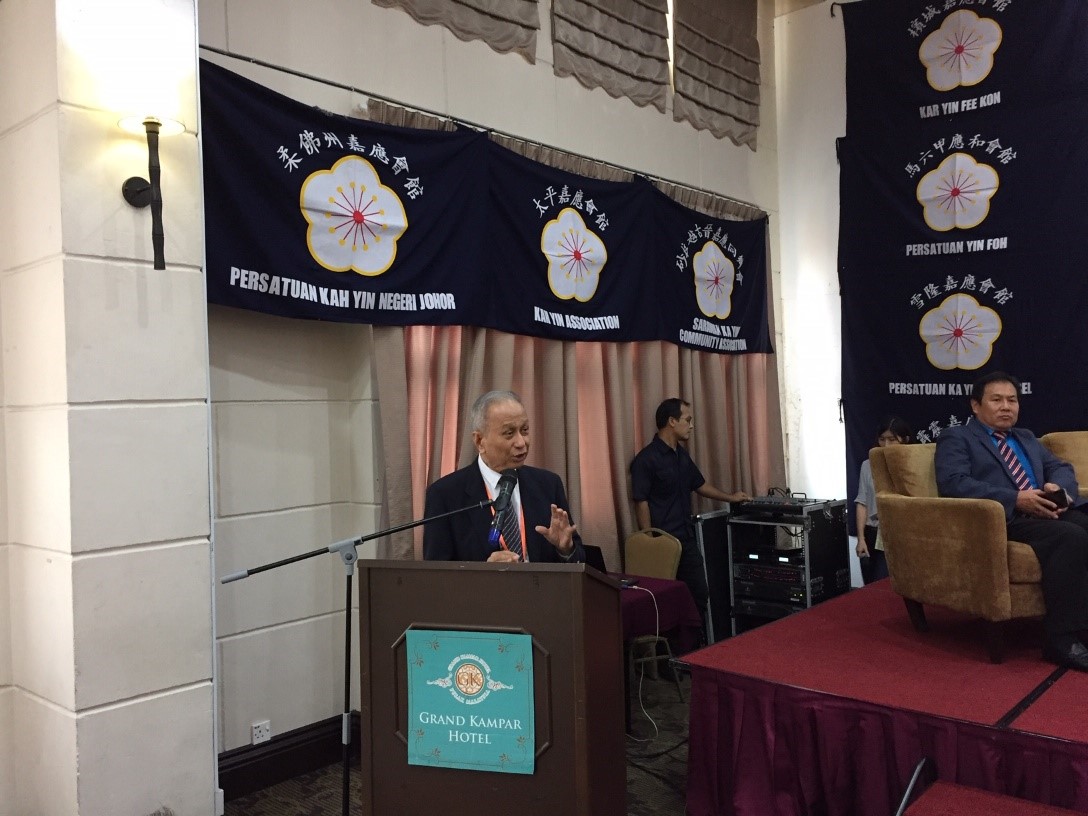
Dato’ Seri Lee encouraging the Federation to continue working closely and strengthening ties with UTAR 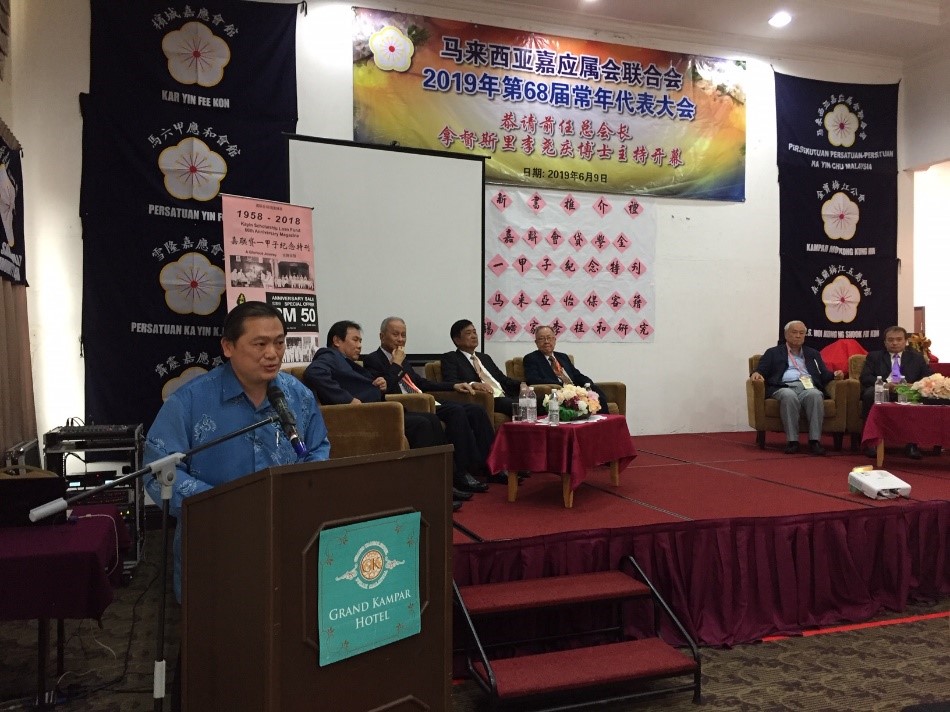
Dr Chong assuring everyone that the tremendous support given by the Federation to ICS will not be in vain 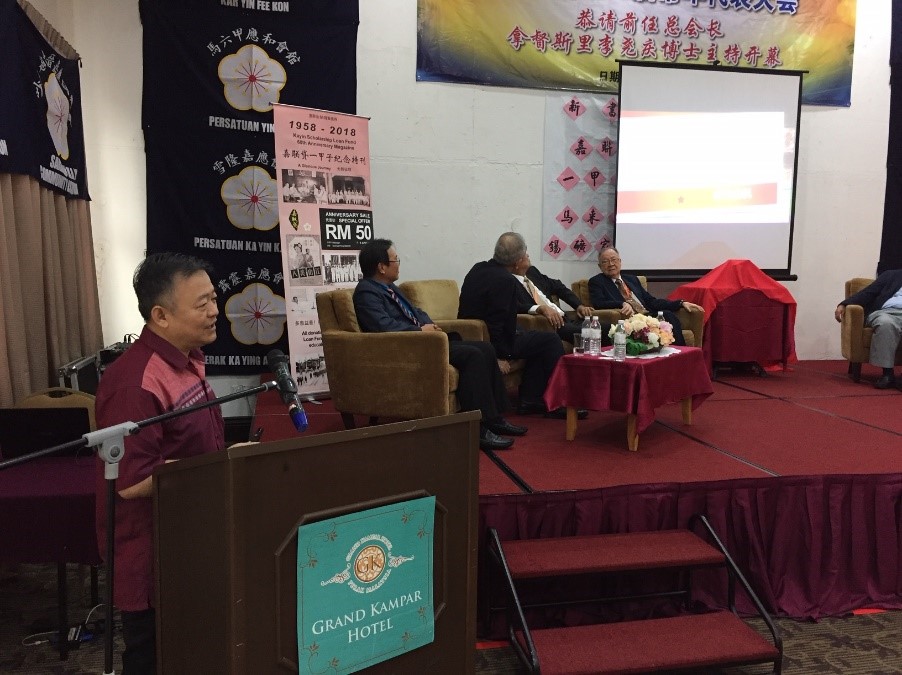
Dr Wong presenting the chronicles of Kwee Foh’s illustrious career 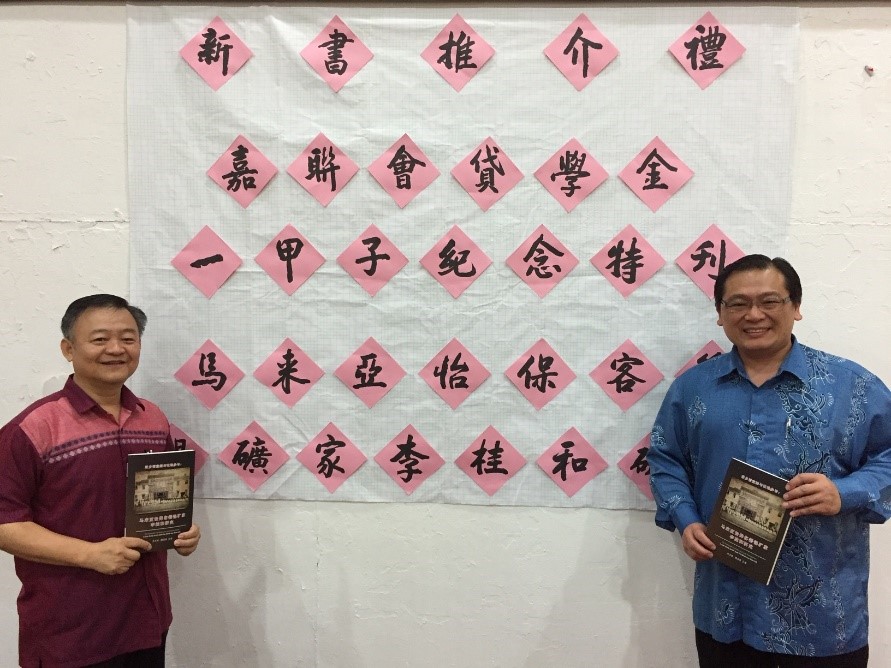
Dr Wong (left) and Dr Chong displaying the newly published book 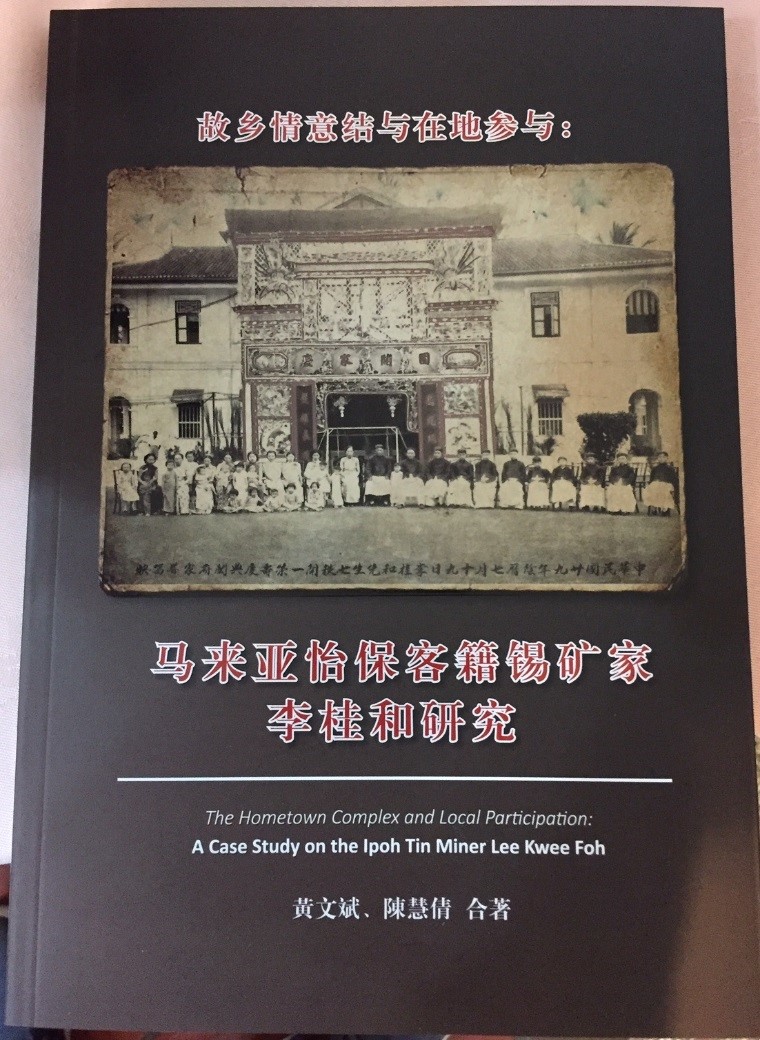
The cover of “The Hometown Complex and Local Participation: A Case Study on the Ipoh Tin Miner Lee Kwee Foh” |
| 2 | The 3rd International Conference on the Chinese Religions 23 August 2019 UTAR, Sungai Long Campus In order to promote international exchange and Chinese religious studies, UTAR Centre for Chinese Studies (CChS) organised the 3rd Conference on Chinese Religions on 23 August 2019 at Sungai Long Campus. Themed ‘Chinese Religions and Multi-ethnic Society’, the conference aimed to enhance the understanding of Malaysian Chinese society and their religious beliefs, as well as to promote the exchange of diverse ethnic social cultures and ideas. Present at the conference were UTAR Vice President for Internationalisation and Academic Development Prof Ir Dr Ewe Hong Tat, conference initiator Prof Zhang YuDong, ICS Dean Assoc Prof Dr Chong Siou Wei, ICS Academic Development and Undergraduate Programmes Deputy Dean Assoc Prof Dr Wong Wun Bin, the Association of Kwong Tong Cemetery Management Kuala Lumpur President Lee Chun Kong, Chong Swee Chu from Buddha's Light International Association (BLIA) Malaysia Chapter, scholars and UTAR staff. Speaking at the opening ceremony, Dr Wong expressed his gratitude to all the parties for their commitment and support, as well as for the many contributions given. He also shared the aims of the conference and briefly explained how they got it started. Prof Zhang, on the other hand, said, “Globalisation has created a borderless world, however, it couldn’t eliminate the boundaries of ethnicity.” He believed that mutual respect and understanding among multi-religious adherents have become an inevitable trend. He also said that religious harmony is an important component in ensuring unity and solidarity of society. He hoped that an event like this could be continuously held in the future to promote exchange and bring about coexistence in the society. Also invited to deliver speeches were Prof Ewe and Chong. In his remarks, Prof Ewe highlighted the importance of interaction and exchange to broaden one’s horizon. He said, “People live in a reciprocally interrelated world. We are able to create a harmonious society through research and dialogue between individuals, institutions and nation, making contribution towards a peaceful future.” Chong delivered her speech on behalf of Venerable Jue Cheng. She emphasised the spirit of respect and tolerance, saying that they are needed for the promotion of unity and noble culture which in return could enhance the prospect of the nation. Another conference with the topic “Master Seet Kim Beng and Buddhism in Malaysia” will be held on 25 August 2019 in Malacca. The seminar aims to promote the study of Master Seet Kim Beng and Malaysian Buddhism, as well as to explore the value of religious culture in the aspects of national development, social progress and cultural heritage. The conference saw the participation of scholars from various countries, namely China, Thailand, Hong Kong and Taiwan. The scholars included Prof Huang HaiDe, Prof Fang ZhengYi, Prof Feng Bin, Assoc Prof Liu ShouZheng, Assoc Prof Zhang ZhongXin and Assoc Prof Zhong DaRong from Huaqiao University (HQU); Prof Chen Jing Xi from Shantou University; Prof Zheng Li from Xiamen University; Wu, Yunlong from Thammasat University (TU); Prof Lo Lung Kwong from the Chinese University of Hong Kong; Prof Huang, Kuo-Ching from Nanhua University; Loh Pai Ling from Buddhist Missionary Society Malaysia; Assoc Prof Tang Chew Peng from Southern University College; Ching Thing Ho from University of Malaya; Fo Guang University postgraduate student Shi HongBing; and UTAR postgraduate student Seck Jue Hong. The conference was jointly organised by UTAR CChS, HQU Research Center for Overseas Chinese Religion and FuJian-Taiwan Religion and TU Institute of East Asian Studies. The two conferences held previously have achieved fruitful results. |
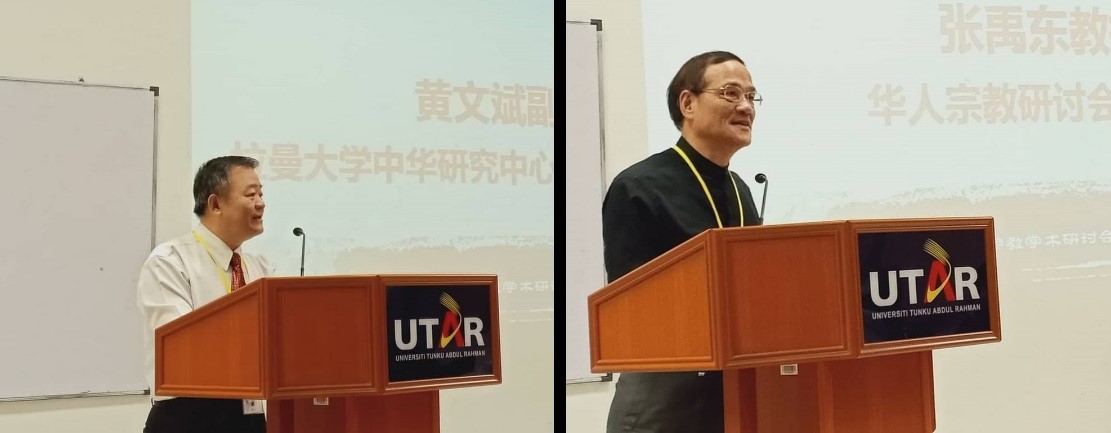
Dr Wong (left) and Prof Zhang delivering their speeches 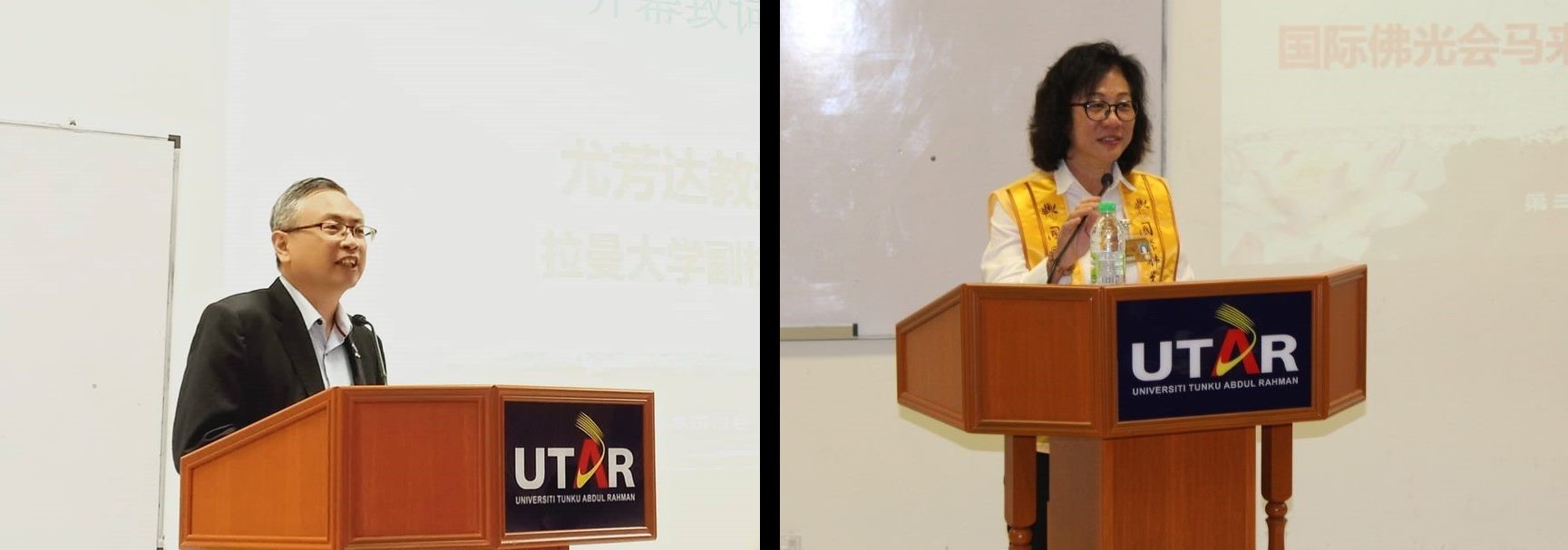
Prof Ewe (left) and Chong delivering their speeches 
Participants listening attentively during the conference 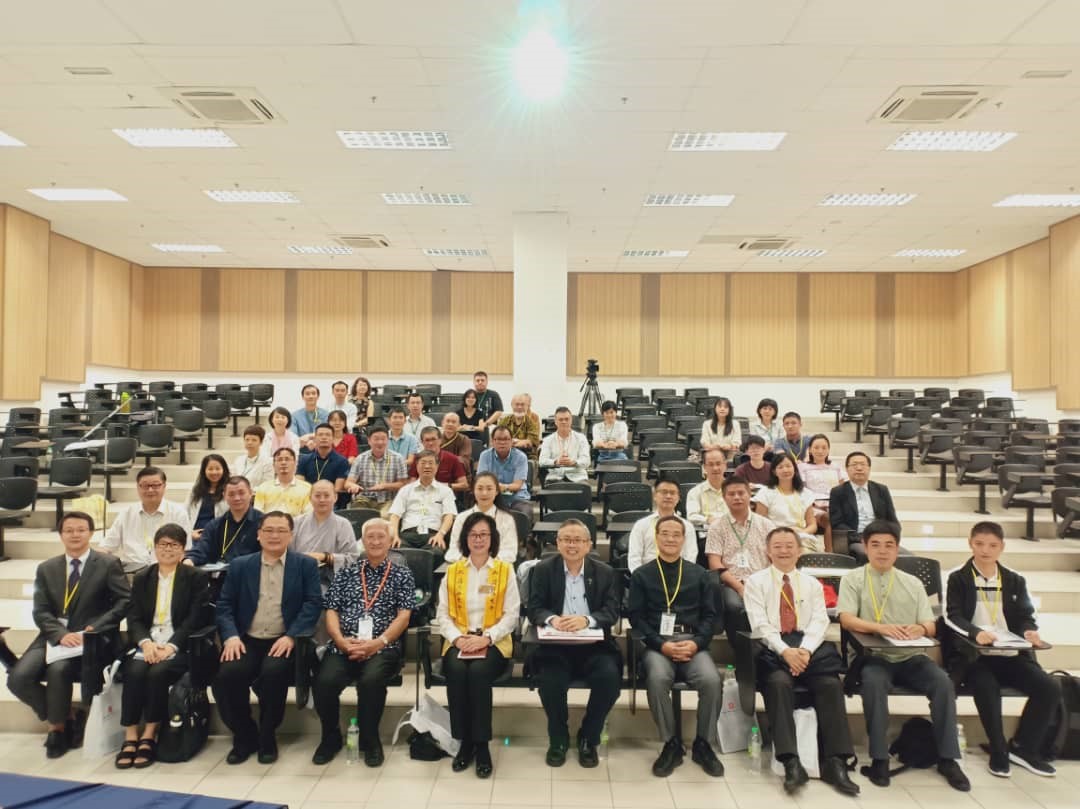
Front row, third from left: Dr Chong, Lee, Chong, Prof Ewe, Prof Zhang and Dr Wong |
| 3 | Historical Sources and Fieldwork: Conference on Datuk Gong Studies 2-3 November 2019 UTAR, Kampar Campus UTAR hosted the “Historical Sources and Fieldwork: Conference on Datuk Gong Studies (史料与田野调查:拿督公研讨会)” from 2 to 3 November 2019 at Kampar Campus. The conference received wide participation from researchers, academics, students and members of the public from local and abroad. The inaugural conference was a joint collaboration between UTAR Institute of Chinese Studies (ICS) and Centre for Chinese Studies (CChS) Malaysian Chinese and Cultural Studies Unit. It was sponsored by Siang Heng Plastic Ware Sdn Bhd. This was also the first conference that came with the theme ‘Datuk Gong Studies' in Malaysia. It explored the traits and connotations of Datuk Gong belief from the perspective of different disciplines such as history, anthropology, sociology, folkloristics, religion and literature in a rigorous academic manner. Invited to officiate the event was ICS Dean Assoc Prof Dr Chong Siou Wei, CChs Chairperson Assoc Prof Dr Wong Wun Bin, Organising Chairperson-cum-Head of Malaysian Chinese and Cultural Studies Unit Dr Tan Ai Boay and Siang Heng Plastic Ware Sdn Bhd Finance Manager Ng Lian Soon representing the company’s Managing Director Dato’ Teoh Boon Teong. Also present at the event were Heads of Department of Chinese Studies for Sungai Long Campus and Kampar Campus Assoc Prof Dr Liau Ping Leng and Dr Toh Teong Chuan, Head of Contemporary China Studies Unit Dr Chin Chong Foh, Head of Sinology Unit Dr Tan Beng Piou and ICS academics. In her welcome speech, Dr Tan Ai Boay expressed her gratitude to ICS, CChs, sponsors and committee members for their commitment and support, and shared the aims of the conference. She revealed, “Datuk Gong is a common god or folk belief among the Chinese community. People always joke and say ‘you will meet Datuk Gong in every corner when you visit Chinese places’, but have you ever thought about what kind of god he is? Datuk Gongs belief is prevalent in Malaysia, Singapore and other places in Southeast Asia, and is a typical example of localisation of local Chinese beliefs in Southeast Asia.” She added, “In fact, many researchers have done research on Datuk Gong from the anthropological and sociological perspectives, and published related journal articles. One of them is Prof Zeng Ling from Xia Men University, who is also one of the speakers at this conference. Therefore, I hope through the sharing of this interdisciplinary study, we will understand Datuk Gong belief from different angles and most importantly open up a new research area.” Regarding the theme, Dr Wong shared, “The conference has a special theme which is related to folk belief. Religious belief, for many years, has served as spiritual and mental sustenance among the Chinese. Datuk Gong belief is one of the very common folk beliefs in our country. Hence it is consecrated in the temples and also construction sites, most of the time.” Further on, he introduced the overview and development of each unit parked under CChs, and said, “The studies on Datuk Gong are closely related to the local research. A number of researches were carried out by our academics and students on religious studies. The studies are related to Buddhism, Taoism, Confucianism, folk belief, Christianity, Catholicism and Islam.” Delivering his welcome address, Dr Chong briefly introduced Kampar Campus and explained UTAR’s development, “As the host for this significant event, we are glad to welcome all the speakers and participants from Malaysia and abroad to our UTAR Kampar Campus. Kampar was once the world’s most famous place for producing tin mining. After the tin mining industry declined in the year 1980, the development of Kampar also went down. However, the establishment of UTAR in 2007 has brought booming development to Kampar in the past 10 years. It has gradually transformed into an education hub for academics, producing intellectuals. Therefore, by organising various academic activities such as this conference today, we hope to provide a platform for the participants to brainstorm ideas, broaden their horizons, absorb more new knowledge and stimulate research sparks.” Sharing his experience, Dr Chong said, “When I was a kid, it was my responsibility to burn incense for Datuk Gong when I go to my grandparents’ house. I still remember the appearance of Datuk Gong; that time it was still a stone, and now it has been transformed into a statue with multiple images. It is worth noting the factors that caused these changes in the past few decades.” Representing Dato’ Teoh, Ng said, “History pays attention to facts, however, Chinese history is rarely written. Dr Tan Ai Boay and her team are working hard to do their field investigation across Malaysia while collecting historical artefacts. This is a race against time and it is very challenging. We have put the historical incense burner for display at the conference, with hope that the participants will learn to cherish the historical relics. Cherishing historical relics are also part of our responsibility to the future generations.” Dato’s Teoh who is also the chairperson of Parit Buntar Datuk Gong Temple (巴里文打拿督公蓝帛古庙), lent the historical incense burner to put it on display at the conference. The participants were also encouraged to guess the words crafted on the incense burner. According to written records, the incense burner from Parit Buntar Datuk Gong Temple was made in the year 1886. This shows that the Datuk Gong Temple is the oldest temple in Perak. The organising committee organised a mini-game session for the participants to guess the words. The fastest person to guess the most number of words was awarded. The conference was divided into six sessions, namely centennial review, research overview, case studies, texts and regions, religious dialogue and cross-domain comparison. The first session was moderated by Prof Zeng; the speakers were Wong Yee Tuan from Penang Institute, Dr Tan Ai Boay and Tang Ah Chai from Action Foundation. The speakers from UTAR included Dr Toh, Dr Liau, Dr Chin and postgraduate students Heah Huey Leng and Ong Min Yu. The conference came to an end with a concluding session that was chaired by Tang. The moderator was Dr Chong. Tang is also a prominent current affairs commentator in the Chinese Malaysian community. He concluded, “After the two days discussion, I found that we had magnified the old stereotype on Datuk Gong and that some of the research findings are closely related to Datuk Keramat, an early belief in this land. However, the conference lays the ground for participants to understand the institutional changes in folk beliefs, from the first dissertation on Chinese beliefs under British colonial during the 19th century, to the control and deterrence under the Islamic legal system. Besides that, Datuk Gong belief has a localisation phenomenon, such as Datuk Gong Temple in Parit Buntar, playing the role on gathering the community; while Datuk Gong golden statue in Lian He Temple, Klang represented the late Sultan Abdul Samad, and these special situations are not found elsewhere. ” He added, “If the conference can be held regularly in the future, I believe research on Datuk Gong studies can become a new research area.” The two-day conference sorted out various rumours and speculations on Datuk Gong’s belief, and at the same time an academic analysis regarding this folk belief was made. With the end of the seminar, a new chapter was opened for Datuk Gong studies, which is a research area that needs to be further explored. |
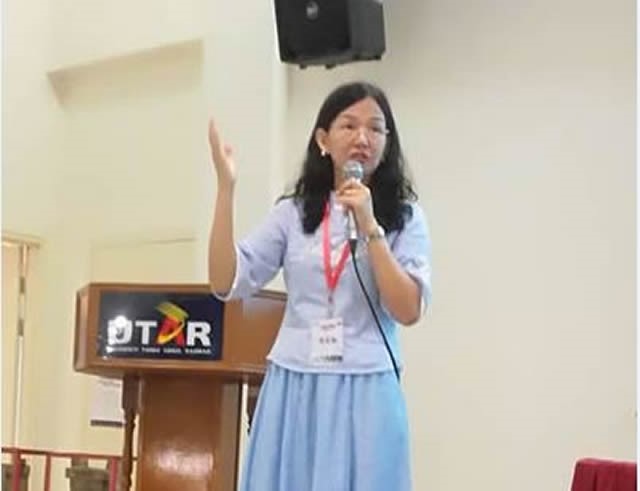
Dr Tan Ai Boay sharing the aims of the conference 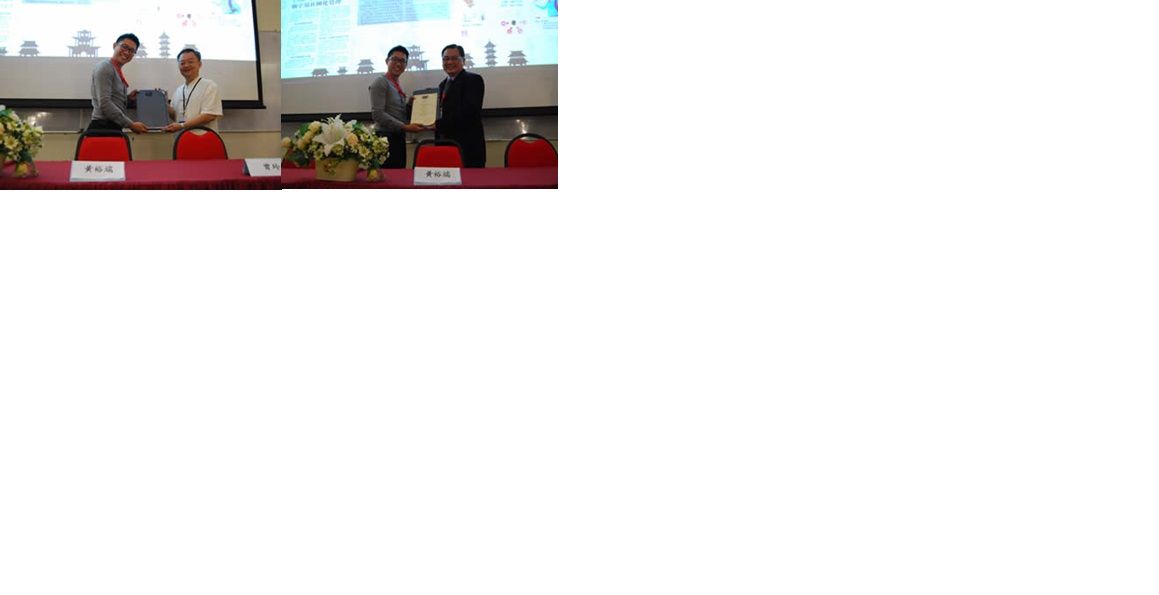
Dr Wong (left) and Dr Chong receiving a souvenir from Ng (right) 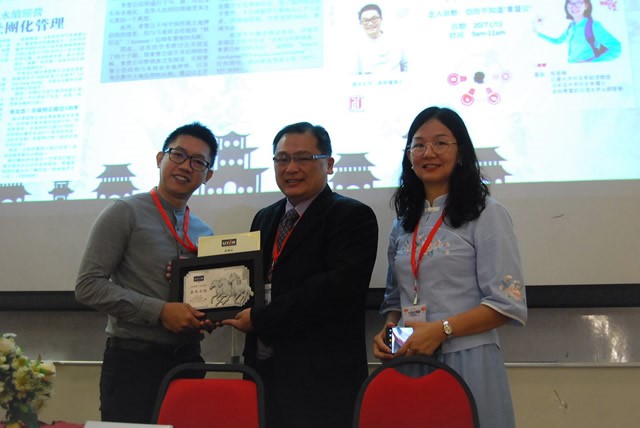
Dr Chong (middle) presenting a token of appreciation to Ng, while Dr Tan Ai Boay (far right) looks on 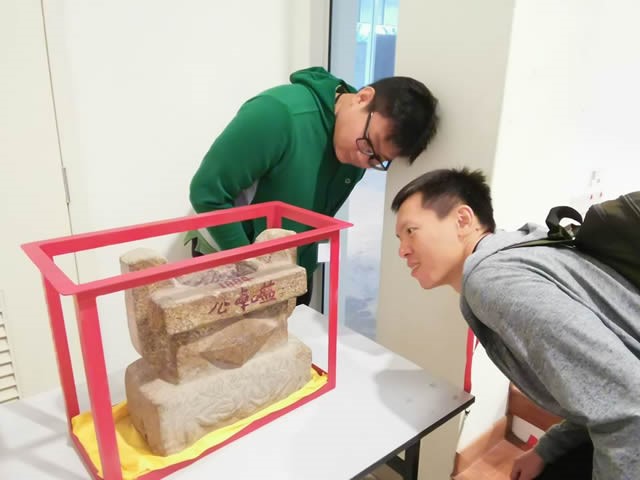
Participants observing the words crafted on the incense burner 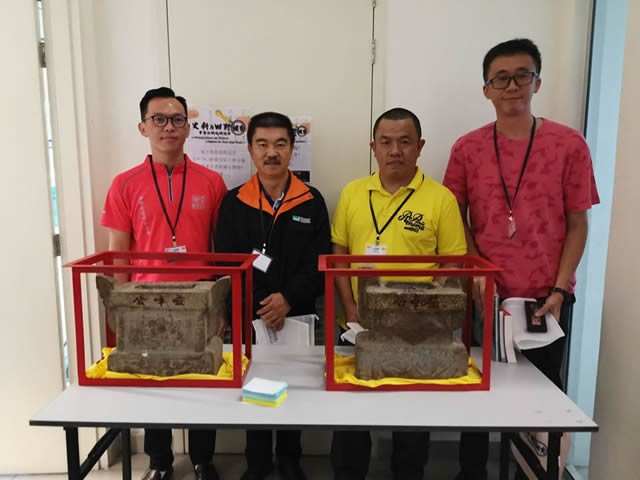
Winners of the mini-game 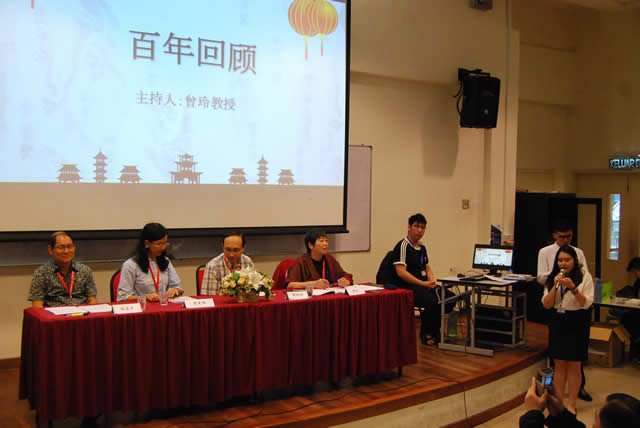
Tang (from far left), Dr Tan Ai Boay, Wong and Prof Zeng during the first session 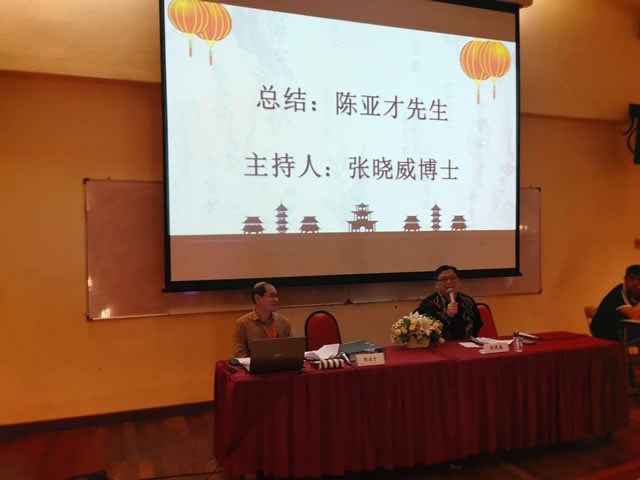
Tang (left) and Dr Chong during the concluding session 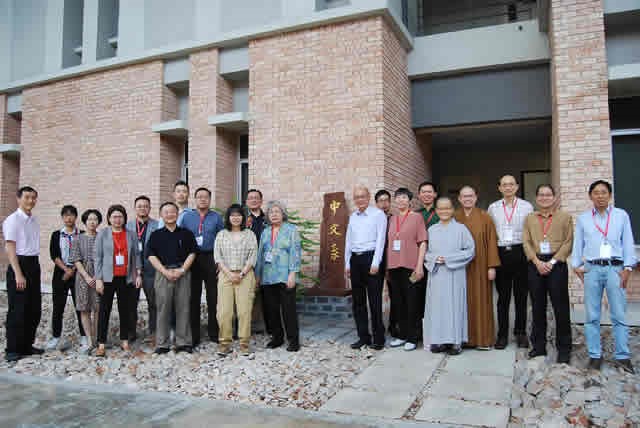
The speakers visited ICS after the conference 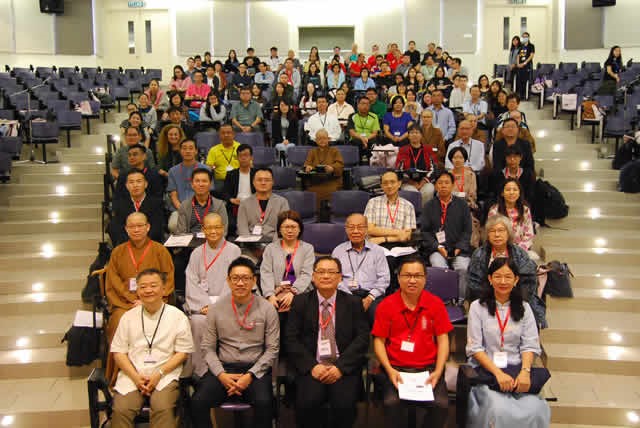
A group photo of the guests, speakers and participants from local and abroad |